Todaropsis
Todaropsis eblanae
Golden arrow squid
Michael Vecchione and Richard E. YoungIntroduction
T. eblanae has a rather short, broad mantle, broad head, long arms and large fins. It is a demersal species commonly associated with the shelf/slope break (Roper, et al., 2010).
Brief diagnosis:
A Todarodinae with ...
- both arms IV hectocotylized.
- funnel groove without foveola.
Characteristics
- Arms
- Arm protective membranes and trabeculae normal.
- Both arms IV hectocotylized.
 Click on an image to view larger version & data in a new window
Click on an image to view larger version & data in a new window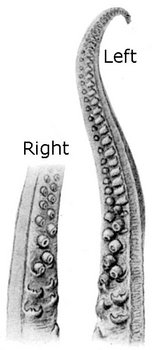
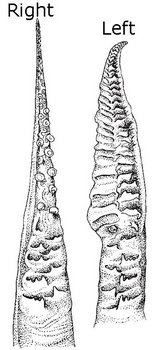
Figure. Oral view of the hectocotylized arms of T. eblanae. Left - Drawing of squid from the Mediterranean from Pfeffer (1912). Presumably the hectocotylus was not fully mature. Right - Drawing of squid from the western Central Pacific from Dunning (1998).
- Tentacles
- Tentacular stalks without free trabeculae.
- Tentacle long with stalk longer than club.
- Large, medial club suckers with 30 or more pointed, subequal teeth, without intermediate ridge or plates; with single larger tooth distally in some specimens.
- Head
- Funnel groove without foveola or side pockets.
- Funnel groove without foveola or side pockets.
- Funnel: Funnel/mantle locking-apparatus
- Fins
- Fins large. Fin length more than 40% of ML.
Distribution
Type locality: Dublin Bay, Ireland.Distribution in the Mediterranean Sea and eastern Atlantic Ocean is from the Shetland Islands to Cape Town, South Africa; in the western Indian Ocean it is associated with several mid-ocean banks; in the Pacific it is found in the South China Sea and off Australia (Roper et al., 2010).
References
Dunning, M. C. 1998. Ommastrephidae. In: Carpenter, K.E.; Niem, V.H. (eds) FAO species identification guide for fishery purposes.The living marine resources of the Western Central Pacific. Volume 2. Cephalopods, crustaceans,holothurians and sharks. Rome, FAO. 1998. 687-1396 p.
Pfeffer, G. 1912. Die Cephalopoden der Plankton-Expedition. Ergebniss der Plankton-Expedition der Humboldt-Stiftung. 2: 1-815.
Roper, C. F. E, Nigmatulin, C. and P. Jereb. 2010. P. 345-347. In: Jereb. P; Roper, C.F.E (eds). Cephalopoda of the world. An annotated and illustrated catalogue of cephalopod species known to date. Vol. 2. Myopsid and Oegopsid Squids. FAO Species Catalogue for Fishery Purposes. No. 4, Vol.2. Rome, FAO. 2010.
About This Page

National Museum of Natural History, Washington, D. C. , USA

University of Hawaii, Honolulu, HI, USA
Page copyright © 2014 and
 Page: Tree of Life
Todaropsis . Todaropsis eblanae . Golden arrow squid.
Authored by
Michael Vecchione and Richard E. Young.
The TEXT of this page is licensed under the
Creative Commons Attribution-NonCommercial License - Version 3.0. Note that images and other media
featured on this page are each governed by their own license, and they may or may not be available
for reuse. Click on an image or a media link to access the media data window, which provides the
relevant licensing information. For the general terms and conditions of ToL material reuse and
redistribution, please see the Tree of Life Copyright
Policies.
Page: Tree of Life
Todaropsis . Todaropsis eblanae . Golden arrow squid.
Authored by
Michael Vecchione and Richard E. Young.
The TEXT of this page is licensed under the
Creative Commons Attribution-NonCommercial License - Version 3.0. Note that images and other media
featured on this page are each governed by their own license, and they may or may not be available
for reuse. Click on an image or a media link to access the media data window, which provides the
relevant licensing information. For the general terms and conditions of ToL material reuse and
redistribution, please see the Tree of Life Copyright
Policies.
- First online 22 November 2011
- Content changed 21 January 2014
Citing this page:
Vecchione, Michael and Richard E. Young. 2014. Todaropsis . Todaropsis eblanae . Golden arrow squid. Version 21 January 2014 (under construction). http://tolweb.org/Todaropsis_eblanae/19935/2014.01.21 in The Tree of Life Web Project, http://tolweb.org/




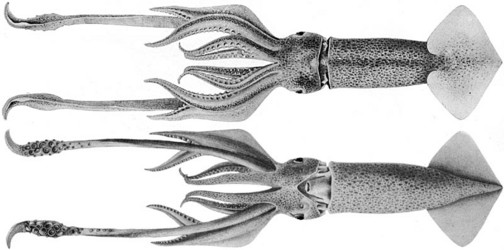
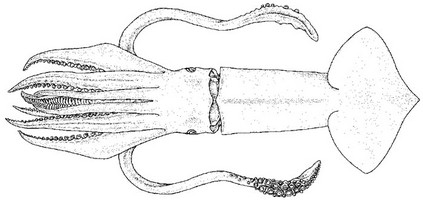

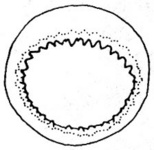
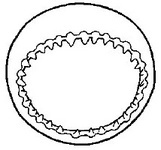
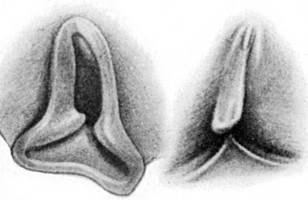
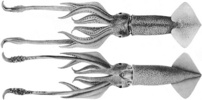


 Go to quick links
Go to quick search
Go to navigation for this section of the ToL site
Go to detailed links for the ToL site
Go to quick links
Go to quick search
Go to navigation for this section of the ToL site
Go to detailed links for the ToL site